What Does a Career in Sports and Exercise Medicine (SEM) Look Like?
A career in Sports and Exercise Medicine (SEM) offers a dynamic and fulfilling pathway, where professionals treat sports-related injuries, promote physical activity, and collaborate with athletes across all levels. SEM experts also conduct research, educate athletes, coaches, and the public, and work closely with other healthcare professionals to improve overall health.

🔍 Key Focus Areas in SEM: Musculoskeletal Medicine (MSK) and Exercise Medicine
Musculoskeletal Medicine (MSK)
MSK medicine revolves around understanding and treating issues related to bones, tendons, ligaments, and cartilage. Key areas of focus include:
- Characteristics and functions of bone, tendon, ligament, and articular cartilage
- Biomechanics and their practical applications
- Prescribing orthotics, including splints, braces, and taping techniques
- Managing exercise and weight control
Exercise Medicine
Exercise medicine involves both individual care and population-level health strategies, addressing:
- Managing chronic diseases and handling complex cases with multiple health conditions
- Promoting physical health at the community level
- Overcoming social and cultural barriers to health and activity
- Understanding public health challenges and developing strategies to improve overall health
💼 Career Opportunities in SEM
A career in SEM can take you in many directions, including:
- Research: Investigating how exercise impacts health, developing new treatments, and pushing the field forward
- Education and Teaching: Teaching medical students, supervising trainees, and creating educational materials
- Sports Medicine Administration: Collaborating with sports organisations to provide medical care and create injury prevention programs
- Military Care: Providing healthcare to military personnel
- Sports Environments: Working in settings like pitchside medical teams during matches
- Public Health: Contributing to community-level health initiatives
📚How to Pursue a Career in SEM: A Step-by-Step Guide
Training and Entry Requirements:
- Complete a medical degree from an accredited university followed by two years of Foundation Training to gain broad clinical experience.
- Specialty Training:
- Choose a pathway: Either Core Medical Training (CT1-2) or Acute Care Common Stem (ST1-2)
CT1 & CT2 are part of an uncoupled specialty training program, where doctors complete 2-3 years of core training before applying separately for higher specialty training. In contrast, ST1 & ST2 are part of a run-through program, where doctors apply only once for ST1 and progress automatically to higher specialty training without needing to reapply. - Apply for SEM Specialty Training: At ST3 level, apply for a specialty post in SEM
- Complete Higher Specialty Training: Undergo four years of focused training in SEM
- Choose a pathway: Either Core Medical Training (CT1-2) or Acute Care Common Stem (ST1-2)
- The FSEM Membership Exam (MFSEM) is taken by SEM trainees at ST5 level and marks a crucial milestone in transitioning from trainee to specialist. This two-part exam is the final step before achieving consultant-level status and qualifying to practice as an SEM physician.
About the MFSEM
The MFSEM assesses both theoretical and clinical expertise in SEM.
- Part 1: A multiple-choice exam covering anatomy, physiology, biomechanics, pathology, and pharmacology
- Part 2: An Objective Structured Clinical Examination (OSCE) that tests clinical skills and professionalism
The British Association of Sport and Exercise Medicine (BASEM) offers revision courses leading up to the exam, usually held four weeks before the test dates.
Upon Completion of Training
After successfully completing the necessary training and exams, you will:
- Receive the Certificate of Completion of Training (CCT), which qualifies you to work as a consultant in Sports and Exercise Medicine (SEM).
- Be added to the General Medical Council (GMC) specialist register.
- Become eligible to apply for Fellowship of FSEM, a prestigious recognition that highlights your advanced expertise and leadership in SEM, earned through extensive clinical experience and significant contributions to the field.
A career in SEM is both rewarding and varied, blending clinical practice, research, and education to help enhance the health and performance of athletes and active individuals. Whether you’re interested in direct patient care, teaching, or research, SEM offers diverse opportunities to make a meaningful impact in the field of healthcare.
Fig 1 (FSEM, 2024) summarises the pathway into SEM

🎓Alternative Pathways to Get Involved
For those who haven’t followed the traditional route, there are alternative ways to specialise in Sports and Exercise Medicine (SEM):
- CESR (Certificate of Eligibility for Specialist Registration): This pathway allows doctors to specialise in SEM through an alternative route, bypassing conventional training programs.
The Portfolio Pathway (formerly CESR) allows doctors who haven’t completed a GMC-approved training program to gain specialist registration by demonstrating the necessary knowledge, skills, and experience (KSEs) for practicing as a specialist in the UK.
- GP with Extended Role (GPwER) in SEM: General Practitioners can take on SEM-related roles, developing expertise in the field without the need for full specialist training. This option allows GPs to enhance their skills while maintaining flexibility in their career progression.
For further information you can check out the document below: SEM speciality guidance
📖 Level Up Your SEM Journey: Essential Resources and Communities
Here’s your cheat sheet to key resources and communities that will support your journey:
The Helm of SEM:
- Faculty of Sport and Exercise Medicine (FSEM): This is your go-to organisation for SEM in the UK. As a medical student, you can become an Associate Member, gaining access to valuable resources, events, and networking opportunities. Keep an eye out for their essay competitions – you could win free conference attendance and cash prizes!
Stay in the Loop:
- USEMS Mailing List: Undergraduate Students of Sports and Exercise Medicine (USEMS) offers a mailing list to keep you updated on events and opportunities specifically relevant to students. To join, simply send “Request to join USEMS mailing list” in the subject line to usemscommittee@gmail.com.
Broaden Your Network:
- British Association of Sport and Exercise Medicine (BASEM): This multidisciplinary organisation connects doctors, physiotherapists, sports therapists, and nutritionists who share a passion for SEM. A BASEM undergraduate student membership (only £2.09/month!) grants you access to educational resources, networking events, and keeps you up to date on the latest advancements.
By joining these communities and utilising their resources, you’ll be well on your way to becoming an SEM pro!
Why Join BASEM?
As an aspiring sports and exercise medicine professional, joining the British Association of Sport and Exercise Medicine (BASEM) offers a host of career benefits:
- Access to Knowledge: Stay updated with the latest research and insights via the British Journal of Sport and Exercise Medicine (BJSM).
- Access to SEM Academy: This e-learning platform features over 70 webinars and content from the latest conference events.
- Networking Opportunities: Connect with like-minded individuals and experienced professionals.
- Career Support: Get guidance on career paths, job applications, and exam preparation.
- Discounted Events: Attend conferences and workshops at reduced rates.
BASEM regularly holds essay competitions, and they invite medical students to submit abstracts for their annual SEM conference!
MTM’s Top Tips for Getting Involved with SEM:
- Prepare for the FSEM Membership Exam: Make use of FSEM’s revision courses, which are intensive and typically held four weeks before each exam.
- Engage with Senior Students: Join university societies and seek advice from experienced students who’ve already navigated the process.
- Network and Stay Informed:
- Attend SEM conferences to connect with professionals, learn about the latest research, and expand your network.
- Join professional organisations like BASEM to gain access to essential resources, updates, and networking opportunities.
- If you’re a medical student, look for projects related to MSK medicine and SEM with the opportunity to present at conferences!
- Participate in essay competitions hosted by FSEM and the Royal Society of Medicine, earning cash prizes and free conference access!
Fig 2. (BASEM, 2024)

UK Universities Offering Intercalated BSc (iBSc) in Sport and Exercise Science:
If you’re looking for further academic opportunities, the following UK universities offer an intercalated BSc (iBSc) in sport and exercise science:
- Loughborough sport and exercise science
- Queen Mary Univerisity London (QMUL) sport & exercise medicine
- University College London (UCL) Sport & Exercise medical sciences
- Leeds sports science in relation to medicine
- Cardiff Metropolitan University sport & exercise science
🎯Benefits of a Career in SEM
- Diverse and Stimulating Work: SEM offers a variety of roles, from clinical practice to research and administration.
- Impactful Work: You can directly contribute to the health and well-being of athletes and active individuals.
- Professional Satisfaction: Helping athletes recover and return to their sport can be incredibly rewarding.
- Good Work-Life Balance: While the job can be demanding, many SEM professionals enjoy a solid work-life balance.
While SEM is still emerging as a specialty in the UK, it is rapidly gaining recognition and offers countless opportunities to make a difference in promoting health and fitness at all levels.
⚠️Potential Drawbacks:
- High pressure: Responsible for immediate care in high-stakes situations, which can be stressful.
- Unusual hours: May involve travel, nights, weekends, and being on call.
- Potential conflicts: Balancing team goals with an athlete’s best interests can be challenging.
- Licensure and education requirements: Requires significant upfront investment in education, including advanced degrees and licensing.
🔗 References & Resources:
Fig 1:
FSEM (2024). Training Pathways – FSEM. [online] FSEM. Available at: https://www.fsem.ac.uk/careers-and-training/training-pathways/ [Accessed 28 Nov. 2024].
Fig 2:
BASEM (2024). Proposed College – BASEM. [online] BASEM – British Association of Sports & Exercise Medicine. Available at: https://basem.co.uk/proposed-college/ [Accessed 4 Dec. 2024].
Education and Knowledge of SEM:
British Association of Sport & Exercise sciences





